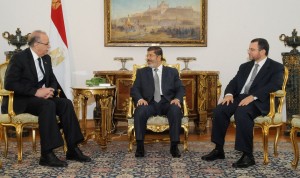By Michel Cousins.

Tripoli, 7 August:
Libyan prime minister Abderrahim Al-Kib visited Egypt on Sunday and Monday at the head of a 20-member . . .[restrict]ministerial delegation. He met with Egypt’s newly-appointed premier Hisham Qandil on Sunday and with President Mohamed Morsi and again with Qandil at Cairo’s Presidential Palace in Heliopolis on Monday.
The Libyan team included Education Minister Sulaiman Sayeh, Justice Minister Ali Humaida Ashour, Scientific research and Higher Education Minister Naim Alghriani, Agriculture Minister Sulaiman Abdulhamid Bu Kharouba, Finance Minister Hassan Zaglam and Military Chief of Staff Yusef Mangoush.
During the visit, agreement was reached on a range of issues relating to Libya’s reconstruction and security.
It was agreed that Egyptian companies should return to Libya to recommence work, particularly construction, and that the hundreds of thousands of Egyptian workers who were in Libya before the revolution and want to return can do so. There was also agreement on Egyptian teachers and academics being recruited to work in Libya.
As part of this there are to be electronic links between the Libyan and Egyptian manpower ministries to coordinate Libya’s requirements and recruitment within Egypt. Border restrictions will also be eased although security will be tightened to deal with smuggling.
There was also an agreement on agricultural cooperation, including animal healthcare, and one on fishing cooperation. This latter should bring to an end the situation where a number of Egyptian fishing boats have been arrested in recent months by Libyan coastguards.
An agreement to train Libyan police at Egypt’s police academies was also signed.
There was broad agreement, too, about joint investment in both countries.
During the visit, Kib invited Hisham Qandil to visit Libya. The Egyptian prime minister accepted.
The Egyptian media have reported that the issue of compensation for Egyptians killed during the Libyan revolution or the more than one million who fled last year was discussed with President Morsi. The Egyptian authorities have in recent months said they want the issue addressed by Libya. However, a report from the Libyan Ministry of Foreign Affairs makes no mention of the matter. Nor was there any indication by either side of Libya’s demand that Egypt hand over the many Qaddafi-era prominent figures now in exile there.
Following his visit to Cairo, Kib flew today to Morocco for a two-day visit with nine ministers, including Zaglam and Ashour, although some of the delegation are expected to stay on in the Egyptian capital for further discussions on cooperation.
In Rabat, Moroccan officials say that the talks there will concentrate on bilateral economic cooperation as well as that within the Maghreb region as whole. Security issues in the region, in particular the crisis in Mali which has been fuelled by a spread of weapons from Libya, are also to be discussed.
“The situation in the Maghreb, in Mali, in the Sahel, as well as in the Moroccan Sahara (the Western Sahara)”, would be on the table a Moroccan foreign ministry official said.
“This visit will focus on political dialogue and the strengthening of economic cooperation” between the two countries, the official added.
It is also expected to focus on allowing more Moroccans to enter Libya to work. Before the revolution there were more than 100,000 in the country.
Last week, Libya and Morocco signed an agreement to ease the movement of citizens between the two countries. It followed a protest by Libya about the fact that Libyans visiting Morocco were being photographed on arrival and departure. Many described the experience as humiliating.
Both countries are members of the Arab Maghreb Union, along with Algeria, Tunisia and Mauritania. Interest in the hitherto all-but dead organisation has revived since the advent of the Arab Spring. In February, it held its first high-level meeting since 1996 in the Moroccan capital, Rabat, during which Libyan foreign minister Ashour Ben Khayal called for it to become a common market. Last week, Morocco and Tunisia held talks on developing it.
There is to be a Maghreb Union summit in Tunisia in October.
Libya, Tunisia and Egypt have separately also been discussing the creation of a regional economic zone.
[/restrict]








